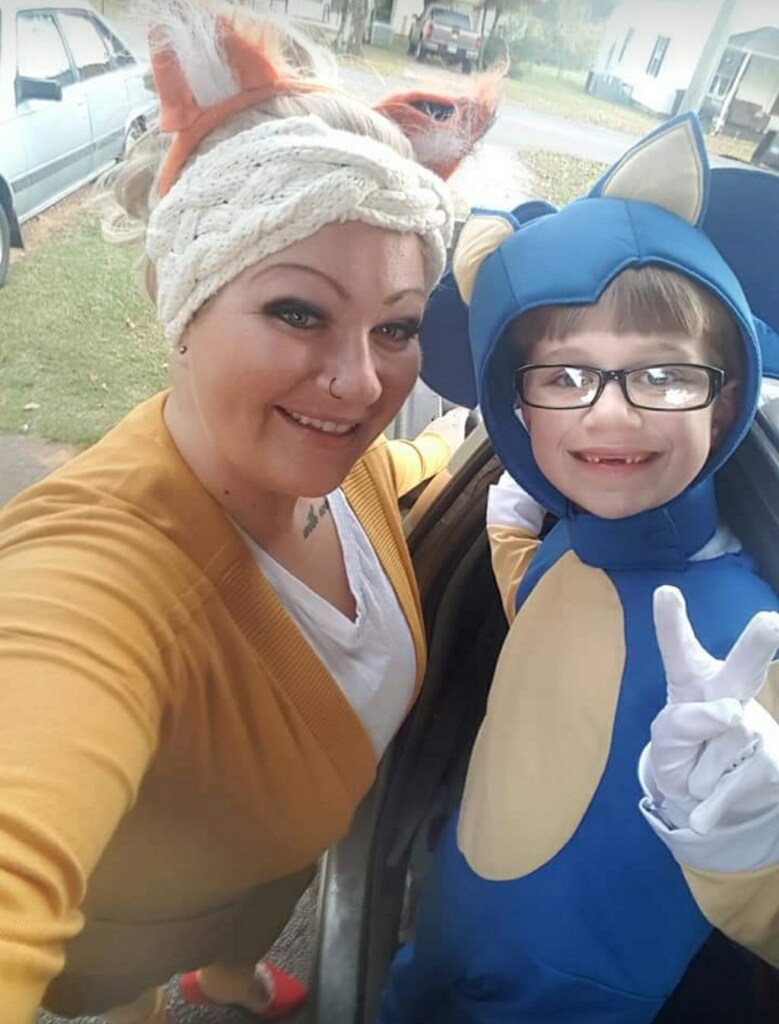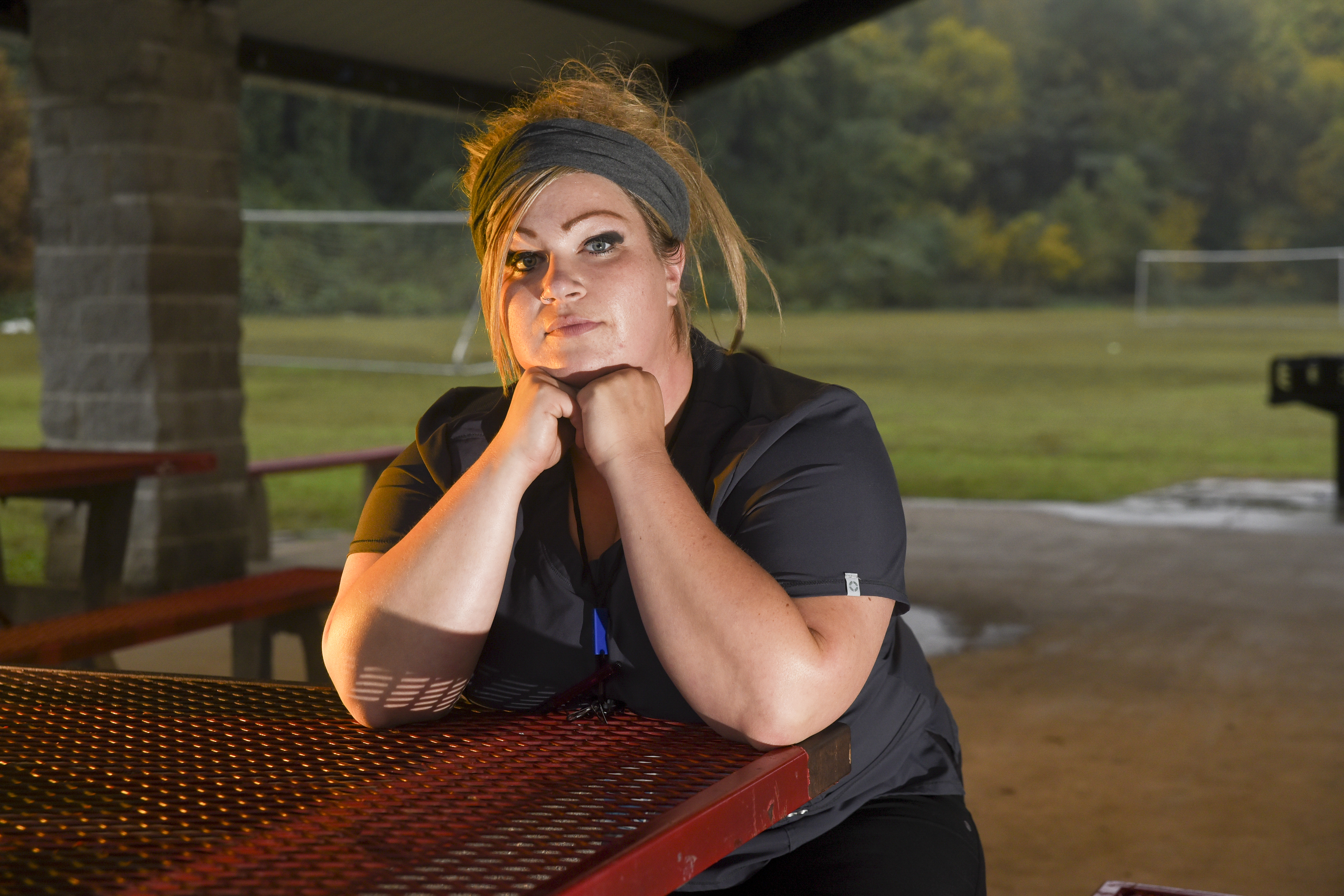Two years ago, Adrianna DeBusk wanted to dress up with her son, Jace, for Halloween and trick-or-treat like they always did.
Jace was wearing his LEGO Batman costume, but she was without a costume of her own. All her money went toward buying the pain pills her body told her she needed to get through the night. She was barely present for the holiday, she said. Her life was consumed by opioid addiction.
Halloween 2017 ended with her getting kicked out of her parents' house, separated from Jace, and wondering how to get help for a problem that began innocently enough six years earlier.
The story of DeBusk's addiction mirrors that of tens of thousands of mothers caught in the opioid crisis after childbirth: It began with a doctor's prescription.
More Info
Do you need help finding free or state funded addiction treatment and recovery services in Tennessee? Call the Tennessee REDLINE: 1-800-889-9789
Jace was born healthy in 2011 but DeBusk needed a Cesarean section, also known as a C-section. She stayed in the hospital for about four days, and although she wound up with a blood clot and an infection that required additional treatment, she was expected to fully recover from her pregnancy.
But like many others, the hospital prescribed Percocet to curb her postpartum pain. The drug contains a combination of acetaminophen (brand name Tylenol) - which relieves pain and reduces fever - and oxycodone - a potent opioid painkiller with a high risk for addiction and dependence.
As the number of pills in her bottle dwindled and her pain subsided, DeBusk began to face a different health problem. Trouble with Jace's father was causing her emotional turmoil, and the Percocet helped relieve that pain, too.
"I was really alone. He wasn't in the picture, so I had to move back to my parents' [house]. I think I was going through postpartum [depression], honestly, because when I took [the Percocet], I felt emotionally so much better," DeBusk said.
Studies on postpartum opioid use reveal that women prescribed opioid pain medications soon after childbirth have a higher risk of developing chronic opioid use regardless of whether they deliver by C-section or have a vaginal birth. Researchers from Vanderbilt University Medical Center estimated that postpartum opioid prescribing caused more than 21,000 new mothers in the United States to become habitual opioid users annually, according to a 2018 study in the American Journal of Obstetrics and Gynecology.
(Read more: Judge sets 2020 date for Tennessee DAs' first trial against opioid manufacturers)
When DeBusk finished the bottle she was prescribed, she continued to seek relief through pain pills. Soon the habit spiraled into addiction, but it flew under the radar as she maintained a steady job and cared for her son.
"I didn't accept the fact that I was an addict. I wanted to pretend I just had a problem and I could fix it," she said.
She started taking Opana ER, an even more powerful opioid. In June 2017, the drug became the first opioid pain medication removed from the market by the U.S. Food and Drug Administration due to widespread abuse.
Caught in a vicious cycle of detox and relapse, she stole money from her parents to pay for her pills. They kicked her out of their house on Halloween night 2017.
A TURNING POINT
DeBusk desperately wanted help but didn't think treatment was an option, since she didn't have health insurance.
Through friends, she learned about a local treatment facility - CADAS - and was able to get in through Tennessee's State Opioid Response grant program. The program also covered Vivitrol, a form of medication-assisted treatment. Medication-assisted treatment uses FDA-approved medications - in DeBusk's case a monthly shot of Vivitrol - along with counseling to treat substance use disorders.
Cassandra Harden, director of nursing compliance at CADAS, said while the long-term goal is to get clients off of all medications, medication-assisted treatment can be a great "tool" to complement counseling by helping to alleviate cravings.
"Recovery looks different for each person, and these medications are not intended to be a wonder pill that cures them - they're tools," Harden said. "It's similar to giving someone with diabetes insulin for a while, but then they can lose weight and come off of it."
DeBusk said although she still had cravings in the beginning, the Vivitrol helped minimize them enough to concentrate on recovery.
"I really had to focus on taking care of me and my mental state and fix those things - until I'm good to myself, I'm no good to anyone else," she said. "I humbled myself and said I didn't have all the answers. I was listening to what they were telling me."
She said the medication was a help but the counseling was essential to her success. Another key component of her recovery was staying away from the environment that led to her addiction. Instead of returning to her hometown of Athens, Tennessee, she lives in sober, transitional housing in Chattanooga.
LOOKING TO THE FUTURE
This Halloween, DeBusk celebrates two years of recovery from opioid addiction and another chance to dress up with Jace - this time as Dog Man and Captain Underpants.
She's rebuilding her life and giving back by working as a technician at CADAS, supporting mothers and their children while they receive treatment.
"It helps me, because I'm a mother, too, so it's cool to see people come in and trying to adjust between work, meetings, kids," DeBusk said. "It gives me a different perspective of how to do things with my son."
She's on track to trick-or-treat with Jace next year and live together again after leaving him with her parents as she focused on recovery.
"I just have to take it a day at a time. As soon as I feel like I've got this is when my ego gets in the way, and I'm headed for danger," DeBusk said.
While medication-assisted treatment isn't appropriate for everyone, Harden said there's a need to get the word out. Even people without insurance have options, she said.
"It is available, and if people need help they can call the state redline," she said. The Tennessee REDLINE (1-800-889-9789) is a toll-free information and referral line that provides alcohol, drug, problem gambling and other addiction information and referrals to all Tennessee citizens.
"It is a disease, and they need support, treatment, housing - and it's going to take the whole community," Harden said, adding that she sees people admitted every day who share stories about their friends who are still grappling with opioid addiction. "We've done a lot, but we need to continue in that direction to really help us get through it all."
Contact Elizabeth Fite at efite@timesfreepress.com or 423-757-6673.


